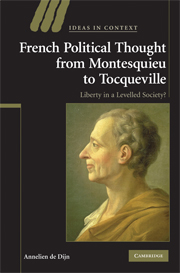Book contents
- Frontmatter
- Contents
- Acknowledgements
- Introduction
- 1 Political thought in eighteenth-century France: the invention of aristocratic liberalism
- 2 Liberty and inequality: the royalist discourse
- 3 A society of equals: the liberal response
- 4 Liberty in a levelled society: Charles Dunoyer, Benjamin Constant, and Prosper de Barante
- 5 The new aristocracy: a theme in Restoration liberalism
- 6 The danger of democracy: Orléanist liberalism and Alexis de Tocqueville
- 7 The French predicament: aristocratic liberalism in the Second Empire
- Epilogue
- Bibliography
- Index
- IDEAS IN CONTEXT
3 - A society of equals: the liberal response
Published online by Cambridge University Press: 22 September 2009
- Frontmatter
- Contents
- Acknowledgements
- Introduction
- 1 Political thought in eighteenth-century France: the invention of aristocratic liberalism
- 2 Liberty and inequality: the royalist discourse
- 3 A society of equals: the liberal response
- 4 Liberty in a levelled society: Charles Dunoyer, Benjamin Constant, and Prosper de Barante
- 5 The new aristocracy: a theme in Restoration liberalism
- 6 The danger of democracy: Orléanist liberalism and Alexis de Tocqueville
- 7 The French predicament: aristocratic liberalism in the Second Empire
- Epilogue
- Bibliography
- Index
- IDEAS IN CONTEXT
Summary
Unlike their royalist contemporaries, many liberal publicists of the Restoration period have escaped obscurity and are still read and commented upon today. Indeed, it is now generally recognized that the early nineteenth century was, as Laurence Jacobs expresses it, ‘a vital and creative period for French liberal thought’. The vitality and creativity of Restoration liberalism is generally attributed to this generation's need to develop a new outlook on liberty that distinguished itself from the Jacobins' republicanism, which had caused the Revolution to fail so dramatically. However, Restoration liberalism was also shaped in direct response to the royalists' aristocratic liberalism. In formulating their political doctrines, post-revolutionary liberals reacted as much against royalism as against Jacobinism, although they started out from a position that was quite close to that of the royalists.
THE ANACHRONISM OF ARISTOCRATIC LIBERALISM
In the immediate aftermath of the Revolution, many liberals turned – as Jacques Necker had done – to the English political model, which had shown itself capable of guaranteeing liberty as well as preserving a high degree of political stability during difficult times. Their admiration for the English example led several important liberal thinkers to adopt a position remarkably close to the royalists' aristocratic liberalism. If the English had been so much more successful at preserving liberty and stability than the French, they argued, this should be attributed first and foremost to their mixed constitution, in which an aristocratic House of Lords held the balance between a more democratic Commons and the king.
- Type
- Chapter
- Information
- French Political Thought from Montesquieu to TocquevilleLiberty in a Levelled Society?, pp. 68 - 88Publisher: Cambridge University PressPrint publication year: 2008



